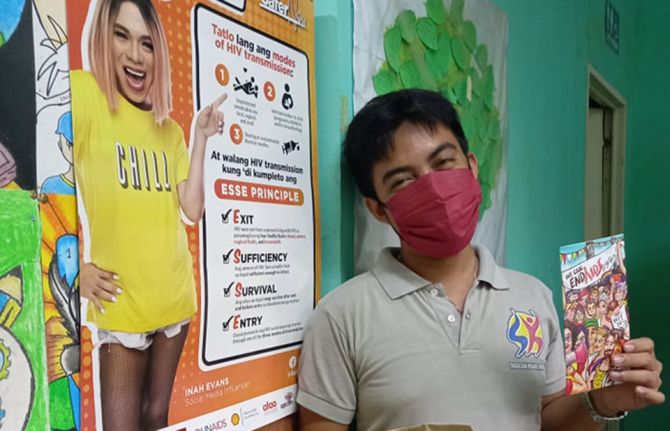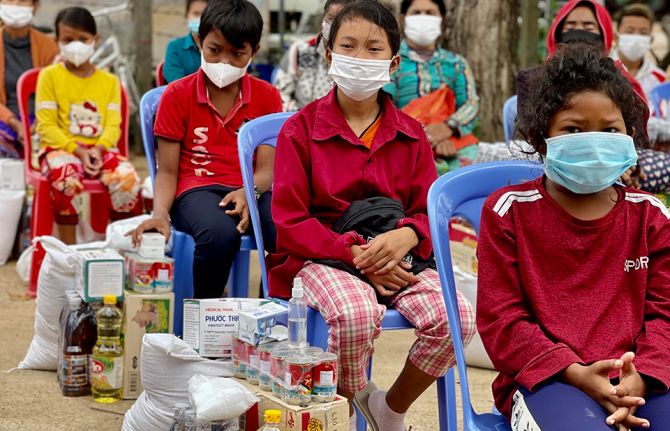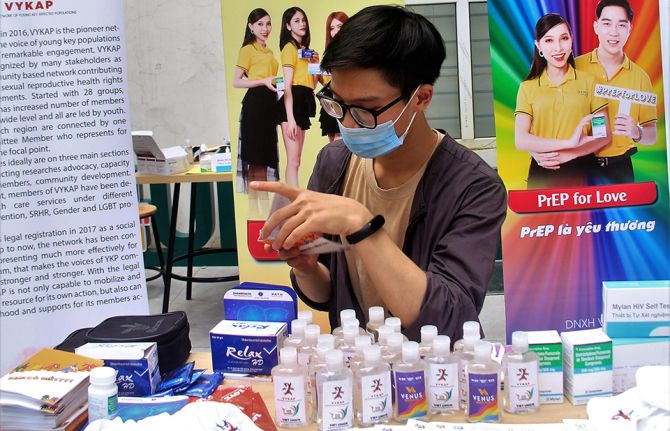



Feature Story
Networks led by young people in Asia and the Pacific find ways to adapt to COVID-19 and deal with uncertain futures
09 February 2022
09 February 2022 09 February 2022Health systems and communities have been pushed to the breaking point by the COVID-19 pandemic, a pandemic that the world was woefully unprepared for. Two years on, networks of key populations and people living with HIV are still at the forefront of the COVID-19 response, working to ensure that communities have access to timely and undisrupted HIV services. Among them is Youth LEAD, the network of young key populations in Asia and the Pacific, which in 2020 established the YKP COVID-19 Emergency Relief Fund to support initiatives led by young people in Asia and the Pacific.
One of the beneficiaries is Ya_All, an organization for young lesbian, gay, bisexual, transgender and intersex (LGBTI) people based in Manipur, India. “The second COVID-19 wave hit north-east India really hard, as it did across the country. We saw health-care systems collapse in front of our eyes. This greatly affected our work as we saw more and more young key populations experience delays in accessing HIV prevention services and saw an increase in mental health issues,” said Sadam Hanjabam, the founder and Chief Functionary of Ya_All. Thanks to the YKP COVID-19 Emergency Relief Fund, Ya_All supported 300 young LGBTI people and members of other key populations to access telecounselling services in five districts to help them with depression and other mental health issues.
Since the outset of the COVID-19 pandemic, the YKP COVID-19 Emergency Relief Fund has helped organizations led by and serving young people implement programmes that ensured young key populations and people living with HIV were not left behind in the HIV and COVID-19 responses. This included providing essential food and supplies of personal protective equipment, information on HIV and COVID-19 prevention and continued access to HIV prevention and treatment services, including mental health services. It also included establishing harm reduction programmes, distributing seed funding for businesses led by transgender people, providing housing and supporting digital and peer-led initiatives.
Funded through the Robert Carr Fund, the AIDS Health Care Foundation and the UNAIDS Regional Support Team for Asia and the Pacific, the YKP COVID-19 Emergency Relief Fund has supported more than 20 projects from 15 organizations led by young people across the region, and has made a considerable difference to the lives of young key populations.
The Viet Nam Young Key Populations Network is one of the beneficiaries of the fund in Viet Nam. Even though the country was in complete lockdown for a substantial period, with a seed grant the network managed to produce HIV and sexual and reproductive health and rights digital educational content for young people at risk of HIV, distributing harm reduction materials to 15 provinces across the country.
Similarly, YPEER Pilipinas, another beneficiary of the fund, trained 1000 young people on HIV combination prevention strategies and screened more than 900 young people for HIV. With a small grant, they were able to scale up the #GetCondomPH Programme, which resulted in successfully distributing more than 11 000 condoms across the Philippines.
In Cambodia, KHANA has given mental health support training to more than 70 LGBTI leaders. The training accelerated ongoing mental health peer support to key affected populations who were experiencing mental health issues. “Online counselling sessions on how to cope with mental health issues were incredibly helpful. The YKP COVID-19 Emergency Relief Fund was an effective mechanism that allowed us to provide timely support to young people in need of HIV prevention and other health services,” said Phorng Chanthorn, Senior Coordinator at KHANA.
These few examples out of the many show that young people, communities and civil society play a crucial role in pandemic responses, helping HIV programmes rebound and adapt to COVID-19 rapidly. Still, these efforts have not been easy. “Youth networks are trying to find ways to recover, adapt and effectively lead in this new funding landscape that has resulted in greater competition for donor funding. Many programmes, including this one, showcase the impact and necessity of supporting youth-led HIV programmes and initiatives. However, it’s not enough,” said Vanessa Monley, Programme Officer at Youth LEAD.
In 2020, young people accounted for 26% of new HIV infections in Asia and the Pacific. In some countries, close to half of new HIV infections were among young people, and one in three members of young key populations do not know their HIV status.
“It is critical to find innovative ways to continue to scale up access to HIV services for young key populations in the context of COVID-19, ensuring that we do not give up achieved gains, and to respond to the additional issues that have come with the pandemic, such as mental health and social support issues. UNAIDS is fully committed to supporting responses led by young people and ensuring their sustainability as we work collectively to end AIDS by 2030,” said Taoufik Bakkali, Director, a.i., of the UNAIDS Regional Support Team for Asia and the Pacific.
Our work
Region/country
- Asia and Pacific
- Australia
- Bangladesh
- Bhutan
- Brunei Darussalam
- Cambodia
- China
- Democratic People's Republic of Korea
- Federated States of Micronesia
- Fiji
- India
- Indonesia
- Islamic Republic of Iran
- Japan
- Kiribati
- Lao People's Democratic Republic
- Malaysia
- Maldives
- Marshall Islands
- Mongolia
- Myanmar
- Nauru
- Nepal
- New Zealand
- Pakistan
- Palau
- Papua New Guinea
- Philippines
- Republic of Korea
- Singapore
- Solomon Islands
- Sri Lanka
- Thailand
- Timor-Leste
- Tonga
- Tuvalu
- Vanuatu
- Viet Nam
- Samoa



